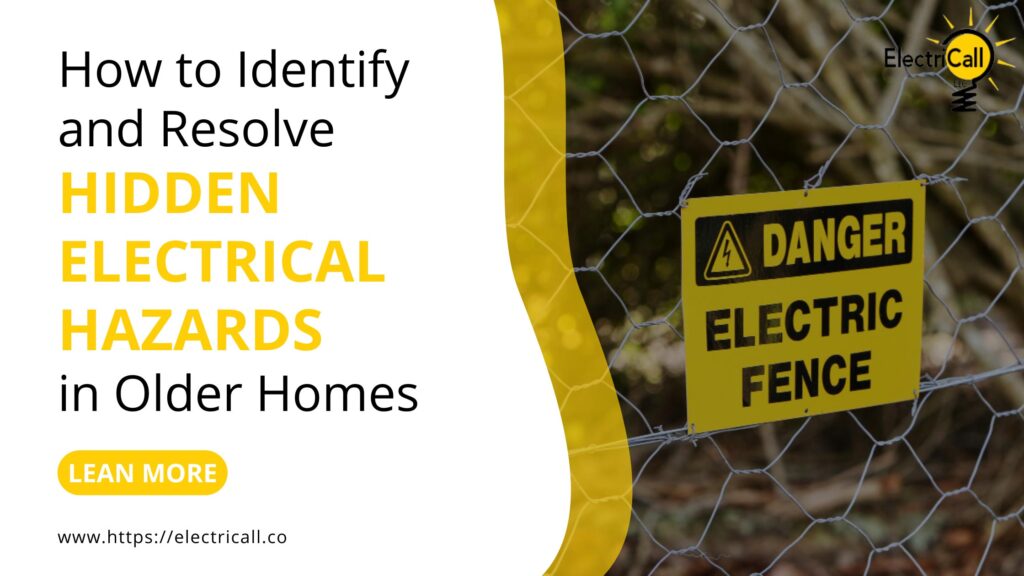
The American Community Survey estimates that the median age of homes in the US is 40 years, with New York having the oldest median age at 62 years.
Colorado’s homes feature slightly below the national median at 36 years old. Of Colorado’s 2.45 million homes, 56.6% were built before 1989, with a whopping 31% built in the housing boom decades of the 1970s and 80s. Therefore, the likelihood of living in an old house is much higher, although such homes are attractive investment prospects as they are cheaper and sometimes offer a charm that modern houses do not.
Though homes generally last up to 70 years on average, their electrical installations typically require inspection and possibly improvement at 25-30 years. After that, they pose significant risks to life and property, diminish the property’s value, and make it costly to maintain and insure.
This article offers a guide to discovering common electrical hazards in older homes and how to mitigate them.
Common Electrical Hazards in Older Homes
Typically, older homes’ electrical systems are hidden from view – behind walls and under floors and are hard to appraise without an inspection. However, you can tell the wiring poses an electrical hazard from its operations. But you must not wait until there are faults in your wiring. Many electrical companies will gladly inspect your home if you live near Denver. Search for “Arvada electricians near me” and you’ll have a list of professional companies you can choose from.
Here are the electrical hazards common in older homes:
1. Old and damaged wiring
The wiring system will be considered old and outdated if the house is older than 40 years. Factors like age, quality of installation, weather, rodent infestation, damages to the walls, and incorrect usage may age the wiring sooner than usual. Visually, you can tell your wiring is old and damaged when the insulation appears torn, cracked, pinched, pierced, or chewed by rodents. Old and damaged wiring also tends to become loose at the switches and outlets.
When in use, you may smell burning, the sockets feel hot, the lights flicker, or there may be tingling sensations when you touch the outlet, switches, or connected appliances. You must never ignore old and damaged wiring as it causes over 30,000 home fires yearly.
2. Outdated electrical systems
The risk posed by most outdated wiring systems poses as much danger as old and damaged wiring, especially if there has been some DIY tinkering in the past. Here are some sure signs the wiring in your house is outdated:
- Knob and tube wiring can be identified by their ceramic knob insulators and the double wiring – one light and the other dark. This wiring system has not been in use since the 1940s.
- Aluminum wiring, especially in houses built in the 1960s and 70s. Aluminum is soft and so prone to crimping and pinching that it may cause fire hazards and electric shocks. The current standard wiring is copper.
- Two prong outlets indicate a lack of grounding throughout the house.
- Lack of GFCI grounding in wet areas.
Besides the apparent risk of fires and electrical shocks, outdated wiring will likely fall below code, making insuring your home costly.
3. Inadequate Amps
Over half the homes in the US were built before the invention of nearly all the home electrical appliances that are mainstays of the modern home. Most were fitted with electrical systems that support energy needs of 60-100 amps, which is inadequate for modern requirements. This amperage is rarely upgraded unless expansion is planned or there is a need to add a large electronic appliance. In contrast, modern homes automatically come with 200 ampere electrical systems.
You can tell the amperage is inadequate if the circuit breaker is frequently tripping or if there is a hiss in the panel box. If the amperage is insufficient, electronic appliances may not run or may be damaged beyond repair. However, it is important to note that this shouldn’t be a big issue since you can get the best Arvada electrician to inspect the appliance and advise you if your amperage is adequate.
4. Insufficient Outlets
Pro tip: One way to tell if an old home’s electrical system has had a recent update is to count the number of outlets in each room. Fewer outlets mean you should take a closer look at the system.
Older homes had fewer appliances to power and needed fewer outlets that could not serve the sheer number of electrical gadgets in a typical modern home. A common way around this is to supplement the outlets with extension cords, which have an untidy look and increase the possibility of overloading the system, which risks both the system and the appliance.
5. Non-Child-friendly Installations
The Electric Safety Foundation estimates that 2400 children suffer severe electrical shocks and burns every year, with 6-12 fatalities.
Children have less of a knowledge and are more vulnerable to the dangers of a poorly maintained electrical system than adults. Electrical installations in old houses were never designed with children in mind — for example, the National Electrical Code did not mandate tamper-resistant receptacles until 2008. Of particular concern are two prong ungrounded outlets that are easily accessible to kids, lack of GFCI in wet areas, and extension cords over which children can trip.
How to Mitigate the Electrical Hazards in Older Homes
A hazardous electrical system does not necessarily mean catastrophe for your home. Upgrading the electrical system will make your home safer, more pleasant, and save you money in energy costs and insurance while boosting your home’s value on the real estate market.
Here are the measures you can take to mitigate the electrical hazards in an old home:
1. Inspection
Have an expert from Arvada Electricall inspect for you. Searching for the best electrician or a local residential electrician will help you get someone you can trust. A professional inspection will reveal all the electrical problems you need to solve for safety, efficiency, and code compliance, and generally involves the following:
- Checking the electrical box outside to assess the condition of the wires and the quality of connection from the house to the power lines.
- Checking the electric panel to assess the components’ integrity to recommend how much power your home needs. If the panel is fuse-based, any qualified electrician will note the need for an upgrade.
- Checking the grounding wire to see if it is sufficient for the expected needs.
- Checking and evaluating the wiring system in the building and taking note of the quality of the latest upgrades, if any.
- Checking the electrical fixtures and outlets throughout the home.
2. Upgrade Wiring
A wiring upgrade in an old house typically targets the wiring system and the wires themselves. If the wiring system in your home is knob-and-tube wiring, then this must be replaced and upgraded, as few insurance companies will be willing to insure it.
An upgrade from the knob-and-tube system is also mandatory to ensure the electrical installation is up to code, especially if you intend to do renovations requiring you to pull the wall down.
Strip and upgrade the wiring to copper standards, especially if insulation has been added to the house in the past. Replace cloth insulated wiring and all damaged wires, being particularly cautious that connections are not loose.
Pick a qualified electrician in Arvada, CO, to install the wiring for you.
3. Upgrade and Increase Outlets
Two-prong outlets are often incompatible with most modern electrical appliances and are always ungrounded. Replace these with three-prong outlets. DO NOT merely replace the outlets without grounding, and replace the outlet if the plug feels loose inside it, as this indicates wear.
Since 2008, the National Electrical Code requires that you install a tamper-resistant receptacle (TRR). TRRs are child-proof outlets that help prevent accidental electrocution when children attempt to push metallic objects into the outlet.
Increase the number of outlets if they are inadequate so that you minimize the use of extension cords that pose a tripping and electrocution hazard for children. Tuck the extension cord out of the way if you must use it.
4. Replace the Electrical Circuit Breaker Panel
Hire a qualified Arvada electrician to replace the electrical circuit breaker. An electrical circuit breaker panel replacement helps prevent fires and steadies the flow of electricity, especially with additional appliances and outlets. Replace the electrical circuit breaker panel if it is original to the house and the house is older than 30 years. Most of these are fuse-based and less effective. A replacement is also due if the circuit breaker trips too often.
A burning smell, a hot panel, and outlets that produce sparks when plugged in are dangerous signs for which you must call an electrician immediately.
5. Install GFCI in Wet Areas
A Ground Fault Circuit Interrupter (GFCI) helps prevent electric shock when it detects electric current flowing through the body into the ground. The risk of accidentally acting as a conductor is higher in the wet areas of older homes without grounding. For old homes undergoing significant renovations, the NEC requires that GFCI be installed in all the wet areas indoors and outdoors, including bathrooms, kitchens, basements, in proximity of laundry machines and sinks, garages, and around the swimming pool.
Conclusion
Houses can last for years, but their electrical installations may not last that long. Such wiring systems have the potential of becoming worn and damaged or just obsolete. When that happens, they are dangerous to life and property, making the home costly.
However, any electrical hazards in your old home can be mitigated by engaging electrical companies in the Denver area to inspect and upgrade the electrical system.



